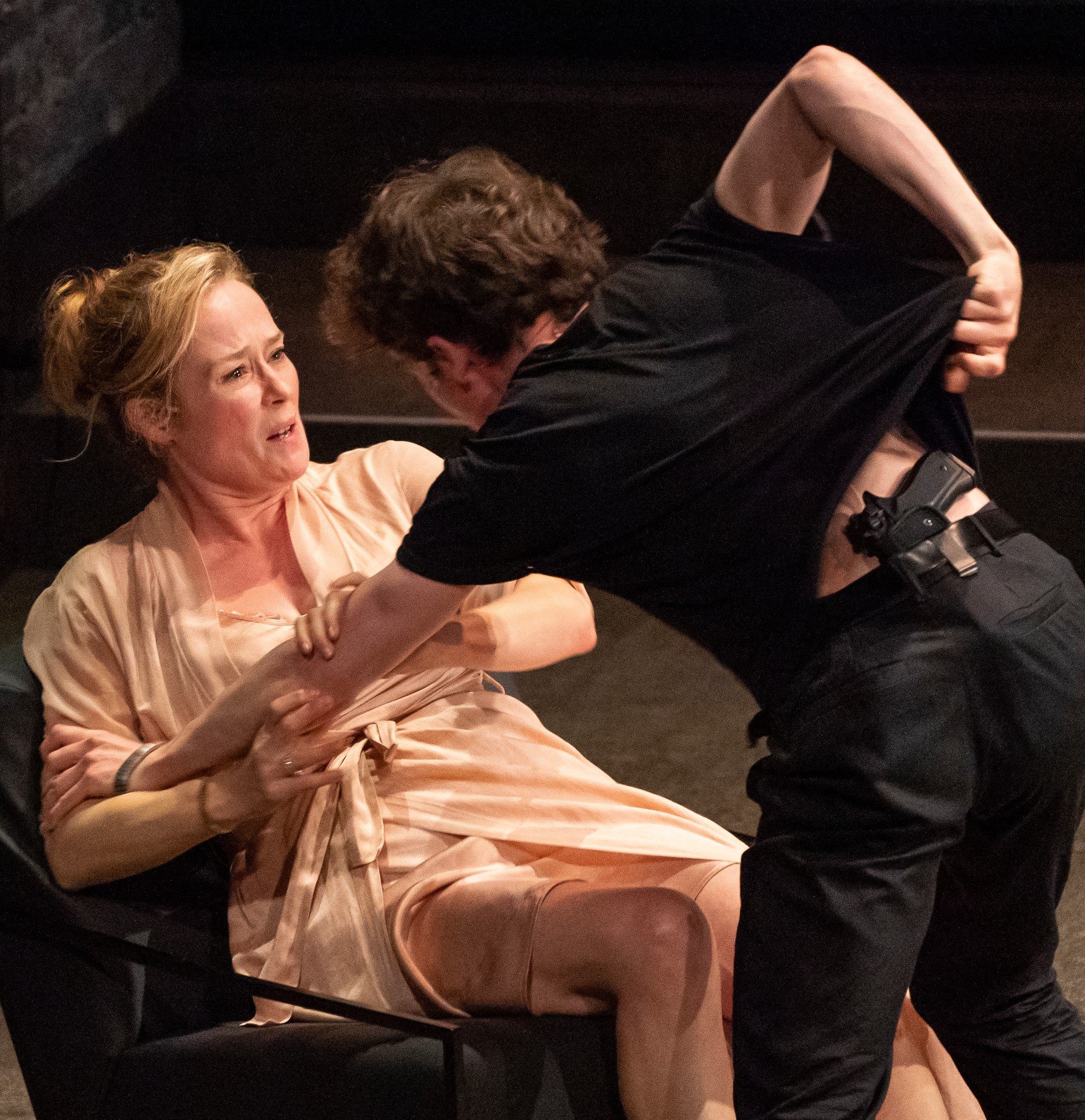Hamlet (Alex Lawther) assures his visiting college chums Rosencrantz (Calum Finlay, left) and Guildenstern (Tia Bannon) that he is not mad.
“If a work is quite perfect,” wrote W.H. Auden about Hamlet, “it arouses less controversy and there is less to say about it.” Across four centuries, critics have found plenty to discuss in this longest of Shakespeare’s plays (also one of his most frequently performed). Auden is prominent among those viewing it as severely flawed. Director Robert Icke has joined the colloquy with an absorbing stage production, now at the Park Avenue Armory, that handles the script’s ostensible defects with aplomb and, in so doing, refutes T.S. Eliot’s suggestion that Hamlet is an “artistic failure.”
Hamlet confronts Gertrude (Jennifer Ehle) with her guilt: “Mother, you have my father much offended.” Photographs by Stephanie Berger.
Sensitively cast, with Shakespeare’s verse and prose exquisitely delivered, this staging features contemporary dress, a spare yet impressive scenic depiction of Elsinore Castle and its environs, and arresting video projections that link the play’s world to our own frightening political moment. Much of the incidental music consists of familiar songs written and recorded by Bob Dylan.
All aspects of the presentation (even the Dylan songs) fit together harmoniously, so there’s never a doubt the director and his compatriots—Hildegard Bechtler (set/costumes), Natasha Chivers (lighting), Tom Gibbons (sound), and Tal Yarden (video)—are aligned in aesthetic vision. The up-to-the-moment visual and aural references these artists have added to the Bard are scrupulously integrated, never merely interpolated. They evoke contemporary associations that explicate the text without bending it to philosophical hobbyhorses.
Prince Hamlet is 27-year-old Alex Lawther, whose boyishness, puckish at times, makes him sympathetic, even as he mopes and stews, obsessed with loss, his mother’s guilt, and the filial obligation to avenge his father’s murder. Lawther’s Hamlet is more perplexed than vexed by the “unweeded garden [growing] to seed” around him.
Hamlet expresses his conflicted feelings to Ophelia (Kirsty Rider), urging her, to go to a nunnery “and quickly too. Farewell.”
Angus Wright is a statesmanlike Claudius, dignified yet frisky with his new queen when he thinks no one is looking. Jennifer Ehle finds heartrending tension between Gertrude’s devotion to her only child and her rejuvenating sexual relationship with Claudius. As the Ghost of Hamlet’s father, David Rintoul lacks the charisma of his younger brother Claudius. His surliness suggests that the late king—Hamlet’s “dear father murdered”—was something less than the humane ruler Hamlet believes him to have been.
This production is revelatory in its take on the relationship between the ruling family and the household of Polonius (Peter Wight). Wight’s Polonius isn’t just a gasbag—yes, he’s windy enough, but also lovingly attentive both to his sovereign and to his offspring, Laertes (Luke Treadaway) and Ophelia (Kirsty Rider). These two dysfunctional families are inextricably bound to each other by shared history and genuine affection. (Even a coldblooded murderer like Claudius may be affectionate.) This is never clearer than in the climactic scene, as the only sons of the two households engage in a ritualistic fencing match which, though deadly, is enacted more in sorrow than in rage. Despite the carnage, it’s undoubtedly the gentlest finale in the history of Hamlet productions.
Eliot’s famous gripe about Shakespeare’s “artistic failure” stems from his critical focus on how the Bard constructed the 1601 tragedy from older works, including at least one play (possibly two) by Thomas Kyd. In Eliot’s judgment, the preexisting material is damagingly unintegrated in the new. Hamlet’s lunacy, says Eliot, is a holdover from those earlier plays and a mental state without an “objective correlative.” To Eliot, the Prince’s behavior is inexplicable and impossible to swallow.
King Claudius (Angus Wright), freshly crowned, and his newlywed queen bid farewell to expatriate courtier Laertes (Luke Treadaway).
Lawther demolishes Eliot’s cavil. At times, his melancholy insouciance gives way credibly to rage at Gertrude’s betrayal of his father, Claudius’s treachery, and the toxic psychodynamics of Elsinore that have permitted things to go so awry. In his most passionate outbursts, his Hamlet is a youth on the verge of defying the Everlasting’s “canon ’gainst self-slaughter.” He’s earnestly weighing “to be” against the option of “not to be.” This Hamlet is neither a hopeless procrastinator nor an idle poseur; he’s a sharp-witted moralist assessing what’s best to do. Some of his kooky japes are punctuated by winking demeanor, suggesting he’s only mad “north-north-west” and perfectly sane when the wind blows “southerly.” He’s convincingly overcome with frustration at what’s rotten in Elsinore.
In Icke’s Hamlet, the Renaissance text speaks eloquently to contemporary spectators, whether they’re familiar with Shakespeare’s times or not. An artistic failure? This play’s among the greatest achievements of world drama. Eliot’s error is imagining one may fully appreciate a dramatic work before theater artists breathe life into it. It’s a good bet a majority of the 904 playgoers at any given performance of this production feel in their bones they’re experiencing artistic triumph.
The Almeida Theatre production of Hamlet runs at the Park Avenue Armory (643 Park Ave.) through Aug. 13 and, beginning July 8, is scheduled in repertory with Oresteia. Evening performances are at 7 p.m., matinees at 1 p.m. For tickets and information, visit armoryonpark.org.






